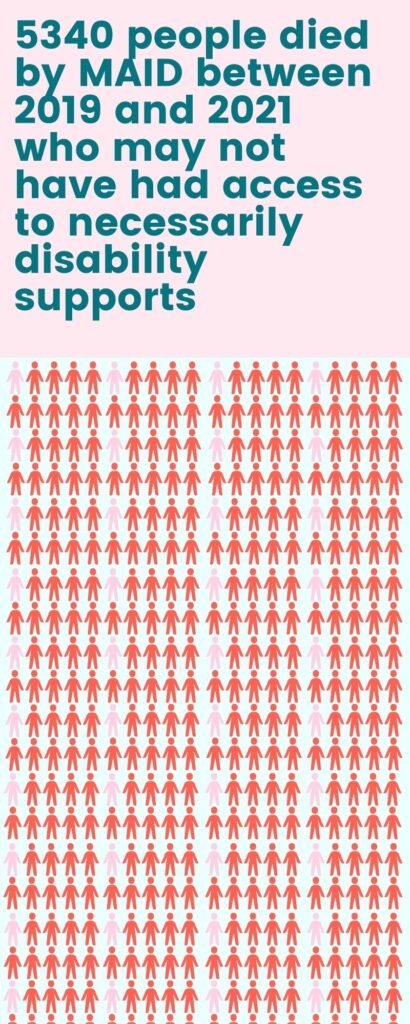
Throughout my many years as a physician, I’ve witnessed firsthand the complex interplay between medical assistance in dying (MAID) and mental illness in Canada. The ongoing debate surrounding this issue has brought to light critical questions about patient autonomy, vulnerability, and the readiness of our health care system as we move into this unchartered space. With the recent legislative changes and temporary exclusion of mental illness as a sole condition for MAID eligibility until, we find ourselves at a pivotal moment in Canadian health care. This article aims to unpack the nuances of this contentious topic, exploring the delicate balance between respecting individual choice and protecting those who may be most vulnerable in our society.
Current Status of MAID for Mental Illness in Canada
The current status of Medical Assistance in Dying (MAID) for mental illness in Canada is in a state of flux. The recent developments have significant implications for patients, healthcare providers, and our entire mental health care system.
Bill C-62 and the Temporary Exclusion
Bill C-62, which received Royal Assent in January 2024, has introduced a temporary exclusion of mental illness as a sole condition for MAID eligibility. This legislative action has effectively paused the expansion of MAID to individuals whose only medical condition is a mental disorder. The decision stems from concerns about the readiness of our health care system to appropriately handle such complex cases.
This temporary exclusion is set to remain in effect until March 17, 2027, unless both Houses of Parliament pass a resolution to end it earlier. During this period, the government intends to focus on strengthening safeguards, developing clear practice standards, and improving access to mental health care across the country.
Challenges in Implementing MAID for Mental Disorders
The main challenge in implementing MAID for mental disorders is properly identifying irremediable conditions. As someone at the forefront of innovation in mental health care with Field Trip, I fear that not enough physicians understand the full range of treatments available for their patients. Moreover, the government isn’t adequately subsidizing treatments that can be life-saving for many individuals with mental health conditions.
Another significant hurdle is the need for comprehensive training and guidelines for health care practitioners. Assessing eligibility for MAID in cases of mental illness requires a nuanced understanding of both the condition and the available treatment options. Without proper education and standards in place, there’s a risk of inconsistent application of MAID across different regions and healthcare settings.
Eligibility Criteria for MAID in Mental Illness Cases in Canada
The eligibility criteria for Medical Assistance in Dying (MAID) in mental illness cases present unique challenges that require careful consideration. I have personally witnessed the transformative potential of innovative mental health treatments, so I believe it’s crucial to approach these criteria with a nuanced understanding of both the complexities of mental disorders and the evolving landscape of therapeutic interventions.
Defining Grievous and Irremediable Conditions
The concept of “grievous and irremediable” conditions in the context of mental illness is particularly complex. In my experience at Field Trip Health, we’ve seen patients who were previously considered treatment-resistant respond positively to novel therapies like psychedelic-assisted psychotherapy. This raises important questions about what truly constitutes an irremediable condition in mental health.
For instance, we had a patient with severe, treatment-resistant depression who had been considering MAID. After undergoing a course of psychedelic-assisted therapy, they experienced significant symptom relief and chose to continue living. Such cases underscore the importance of exhaustively exploring all available treatment options before concluding that a condition is irremediable.
Assessing Capacity and Autonomous Decision-Making
Assessing capacity for autonomous decision-making in individuals with mental illness requires a delicate balance. On one hand, we must respect the autonomy of patients who are capable of making informed decisions about their care. On the other, we must ensure that these decisions are not unduly influenced by the symptoms of their mental health condition.
In my clinical practice, I’ve observed that a patient’s capacity can fluctuate over time, particularly in cases of severe mental illness. This variability necessitates a thorough, ongoing assessment process. It’s crucial that health care practitioners are well-trained in conducting these assessments and are aware of the potential impact of mental health symptoms on decision-making capacity.
| Suicide | MAID |
| People thinking about suicide do not actually want to die, they want the pain of living to end | Hastens death for people in irremediable circumstances |
| Often carried out alone and in secrecy, leaving loved ones with devastating grief | Involves decision-making by medical personnel and the option to involve loved ones |
| Often violent and carried out by people who do not enter or are misunderstood by the medical system | Non-violent medical intervention |
| With appropriate support and care, recovery is possible | Increased palliative care can help ease the suffering of the dying |
Source: Canadian Centre for Suicide Prevention
Balancing Autonomy and Vulnerability in MAID
The intersection of medical assistance in dying (MAID) and mental illness presents a complex ethical landscape that requires careful navigation; it’s a delicate balance between respecting individual autonomy and safeguarding those who may be vulnerable due to their mental health conditions.
Respecting Patient Autonomy in Mental Health Care
In my experience at Field Trip Health and through research collaborations, respecting patient autonomy is paramount in mental health care. Patients with mental illness, like all individuals, have the right to make informed decisions about their treatment and care. This includes the potential consideration of MAID as an option in severe cases.
However, autonomy in the context of mental illness is nuanced. We must ensure that patients have access to comprehensive information about their condition, prognosis, and all available treatment options. This is especially crucial given the rapid advancements in mental health therapies, including psychedelic-assisted treatments, which have shown promise for previously treatment-resistant conditions.
Addressing Vulnerability and Social Distress
While respecting autonomy, we must also recognize the inherent vulnerability that often accompanies mental illness. Social determinants of health, such as poverty, lack of social support, and limited access to mental health resources, can significantly impact a person’s mental state and their perception of available choices.
In my clinical practice, I’ve seen how addressing these social and environmental factors can dramatically improve a patient’s mental health and outlook on life. It’s crucial that any consideration of MAID for mental illness includes a thorough assessment of these external stressors and efforts to mitigate them through appropriate interventions and support systems.

Source: Inclusions Canada MAID Data
Health System Readiness for MAID and Mental Illness
The readiness of our health system to handle Medical Assistance in Dying (MAID) for mental illness is a critical concern. I’ve observed significant gaps in our current system that need addressing before we can responsibly implement MAID for mental disorders.
Training and Guidelines for Health Care Practitioners
In my experience working with medical professionals across Canada, I’ve noticed a concerning lack of standardized training and guidelines for assessing MAID eligibility in mental illness cases. Many practitioners, even those with extensive experience in mental health, feel unprepared to navigate the complex ethical and clinical considerations involved.
To address this, we need comprehensive, nationwide training programs that cover not only the legal and procedural aspects of MAID but also the nuances of mental health assessment, treatment resistance, and emerging therapies. This training should be mandatory for all health care providers involved in MAID assessments and should be regularly updated to reflect the latest research and best practices.
Developing Mental Health Resources and Support
Another crucial aspect of health system readiness is the development and expansion of mental health resources. Through my work at Field Trip Health and collaborations with various universities, there is a ton of transformative potential using innovative therapies like psychedelic-assisted treatments. These options, however, are not yet widely available or understood by many health care practitioners.
We need to invest in a broader range of mental health supports, from traditional therapies to cutting-edge treatments. This includes improving access to psychotherapy, expanding community-based mental health programs, and supporting research into novel treatments. Only by offering a comprehensive suite of options can we ensure that MAID for mental illness in Canada is truly a last resort.
Safeguard Measures for MAID in Psychiatric Conditions
There is a vital need for robust safeguard measures for Medical Assistance in Dying (MAID) in psychiatric conditions. These measures are essential to protect vulnerable individuals while respecting the autonomy of those who may be eligible for MAID due to severe mental illness.
Consultation Requirements and Waiting Periods in Canada
In my clinical experience, I’ve observed that thorough consultation requirements are crucial for ensuring that MAID requests in psychiatric cases are carefully evaluated. These consultations should involve multiple mental health professionals, including psychiatrists with expertise in the specific condition in question. It’s not uncommon for me to collaborate with colleagues from various specialties to get a comprehensive understanding of a patient’s condition and treatment history.
Mandatory waiting periods are equally important. They allow time for careful assessment and provide opportunities for alternative treatments. For instance, at Field Trip Health, we’ve seen patients who initially considered MAID but found significant relief through innovative therapies like psychedelic-assisted psychotherapy during the waiting period. These periods also help ensure that the decision is consistent over time and not influenced by temporary factors or acute episodes.
Distinguishing Between Suicidal Ideation and MAID Requests
One of the most challenging aspects of MAID in psychiatric conditions is distinguishing between suicidal ideation and a genuine request for assisted dying. As a physician who has treated many patients with severe mental illness in Canada, I can attest to the complexity of this distinction. Suicidal thoughts are often a symptom of mental illness that can fluctuate over time and respond to treatment, whereas a MAID request should be a stable, well-considered decision.
To address this, we need comprehensive assessment tools and guidelines that help practitioners differentiate between these two scenarios. This involves evaluating the consistency of the request over time, the patient’s understanding of their condition and prognosis, and their response to various treatments. It’s crucial that we approach each case with empathy and thoroughness, ensuring that all available treatment options have been explored before considering MAID.
Impact of MAID on Mental Health Care in Canada
The introduction of Medical Assistance in Dying (MAID) for mental illness in Canada has far-reaching implications for our mental health care system. It’s crucial to examine how MAID might reshape our approach to mental health care and potentially drive improvements in our current system.
Addressing Stigma in Psychiatry
The introduction of MAID for mental illness has brought the issue of stigma in psychiatry to the forefront. Stigma can significantly impact patient care and outcomes. The MAID debate has highlighted the need for a more nuanced understanding of mental illness among both healthcare professionals and the general public.
This increased attention could lead to more open discussions about mental health, potentially reducing the stigma associated with psychiatric conditions, which we hope to see. It’s an opportunity to educate people about the complexities of mental illness and the various treatment options available, including innovative therapies like psychedelic-assisted treatments that we offer at Field Trip Health.
Enhancing Mental Health Access and Support
The MAID debate has also shone a spotlight on the gaps in our mental health care system, and I believe this could be a catalyst for improving access to mental health resources and support across Canada. The temporary exclusion of mental illness as a sole condition for MAID eligibility provides an opportunity to strengthen our mental health care infrastructure, hopefully lead to increased funding for mental health research, expansion of community-based mental health programs, and improved access to a wider range of therapies.
At Field Trip Health, we’ve seen the positive impact of innovative treatments like psychedelic-assisted psychotherapy. The MAID debate could accelerate the integration of these novel approaches into mainstream mental health care, providing more options for those with treatment-resistant conditions.
Future Considerations for MAID and Mental Illness
As we look towards the future of Medical Assistance in Dying (MAID) for mental illness in Canada, it’s clear that we’re entering uncharted territory. The ongoing debates and legislative changes reflect the complexity of this issue. I believe it’s crucial that we approach these future considerations with a balance of caution and open-mindedness.
Ongoing Parliamentary Review and Expert Panel Recommendations
The parliamentary review process and expert panel recommendations will play a pivotal role in shaping the future of MAID for mental illness. The ongoing review must involve a wide range of stakeholders, including mental health professionals, ethicists, legal experts, and importantly, individuals with lived experience of mental illness.
These reviews and recommendations should focus on key areas such as refining eligibility criteria, strengthening safeguards, and improving access to mental health resources. It’s crucial that these discussions are informed by the latest research in mental health treatment, including innovative therapies that have shown promise in treating previously resistant conditions.
Potential Developments in Health Care Policies and Standards
As we move forward, I anticipate significant developments in health care policies and standards related to MAID and mental illness. Based on my work at Field Trip Health and my research collaborations, I believe we’ll see a push for more comprehensive and standardized assessment protocols for MAID requests in mental illness cases. These will likely include mandatory consultations with multiple mental health specialists and extended observation periods to ensure consistent decision-making capacity.
Additionally, I expect to see increased emphasis on integrating MAID discussions within broader mental health care frameworks. This could involve developing new practice standards for discussing end-of-life options with mental health patients, as well as guidelines for ensuring all treatment options have been thoroughly explored before considering MAID. Ultimately, these policy developments should aim to strike a balance between respecting patient autonomy and safeguarding vulnerable individuals.
Shaping the Future: MAID, Mental Illness, and Evolving Health Care Policies in Canada
The intersection of Medical Assistance in Dying (MAID) and mental illness presents a complex landscape that will continue to evolve in the coming years. As we navigate this challenging terrain, it’s crucial that we maintain a delicate balance between respecting individual autonomy and protecting those who may be most vulnerable. The temporary exclusion of mental illness as a sole condition for MAID eligibility provides us with a valuable opportunity. We must use this time to strengthen our mental health care system, develop comprehensive safeguards, and ensure that all available treatment options are exhausted before considering MAID.
I’ve witnessed the transformative potential of novel therapies such as psychedelic-assisted psychotherapy and repetitive transcranial magnetic stimulation (rTMS) and have seen patients get their lives back. These experiences underscore the importance of continually expanding our understanding of mental illness and exploring new avenues for treatment. As we move forward, it’s essential that we remain open to new perspectives and emerging research, as the ongoing discussions surrounding MAID and mental illness have the potential to drive positive change in our health care system. By addressing stigma, improving access to mental health resources, and fostering open dialogue, we can work towards a more compassionate and effective approach to mental health care. The decisions we make today will shape the future of mental health care in Canada. Let us approach this challenge with empathy, wisdom, and a commitment to the well-being of all Canadians struggling with mental illness.
Frequently Asked Questions
Due to concerns about adequate safeguards and system readiness, the eligibility for MAID based solely on mental illness has been postponed until March 2027.
The government aims to strengthen safeguards, improve mental health care access, and develop clear standards for MAID in cases involving mental illness.
It refers to conditions causing severe, intolerable suffering that have not responded to any reasonable treatment options, though this is complex in mental health cases.
This balance requires respecting a patient’s choices while ensuring they are not influenced by treatable mental health symptoms or lack of support.
Capacity assessment in mental illness cases is rigorous, often requiring repeated evaluations by trained mental health professionals to ensure informed consent.
Before MAID is considered, all reasonable treatments, including innovative options like psychedelic-assisted therapy, must be explored to ensure comprehensive care.
About the Author

Dr. Mario Nucci MD CCFP is a licensed Family Physician with a passion for mental health and the development of new therapies. He is actively engaged in research with a faculty associate professorship at Northern Ontario School of Medicine, and research collaborations with the University of Ottawa, University of Calgary, Lakehead University, Concordia University and Vancouver Island University.
Dr. Nucci is the founder of Bay and Algoma Health Centre in 2019, a walk-in and addiction medicine clinic. He founded the Canadian Centre for Psychedelic Healing in 2019, now operating as Field Trip Health, providing cutting edge mental health care in Toronto, Montreal, Vancouver, Ottawa, Hamilton, Kitchener-Waterloo, Thunder Bay, Sault Ste. Marie, and at-home.